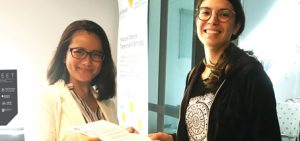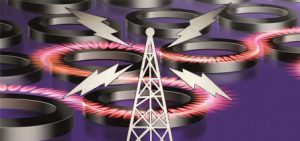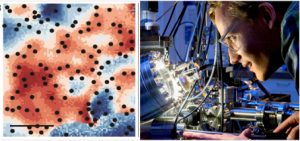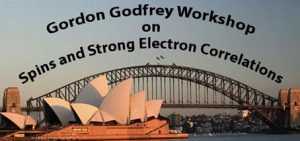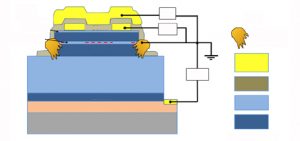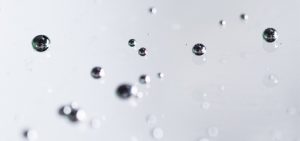FLEET News
“I love working in FLEET because it challenges me all the time, and because it has deepened my understanding in an essential topic to the progress of technology. I thought I would never be capable to work in an environment full of such brilliant minds.” Jessica Alves at Monash University Engineering is the recipient of FLEET’s first Women in FLEET …
FLEET Director Michael Fuhrer spoke Friday with ABC Radio 2CC Canberra’s Rod Henshaw about making physics more accessible, and FLEET’s search for better, ultra-low-energy transistors. Listen Prof Fuhrer was in Canberra for the International Physics Summer School on Topological Matter at ANU. Fuhrer discussed energy use in information and communications technology (ICT) and the alternatives that FLEET is pursuing, …
Electronically-smooth nature of trisodium bismuthide makes it a viable alternative to graphene/h-BN Researchers have found that the topological material trisodium bismuthide (Na3Bi) can be manufactured to be as ‘electronically smooth’ as the highest-quality graphene-based alternative, while maintaining graphene’s high electron mobility. Na3Bi is a Topological Dirac Semimetal (TDS), considered a 3D equivalent of graphene in that it shows the same …
Sharing best practice, finding efficiencies, setting up future networks – and swapping a few war stories Operations staff from 18 ARC-funded centres met in Melbourne last week to share best practice and learnings, and to develop future networks among similar roles. How do centres become ‘greater than the sum of the parts’? What strategies have professional staff found to enhance …
Reaching schoolkids, and setting scientists up for outreach success Bringing practising scientists to schools brings enormous benefits. The FLEET Geeks program sees FLEET members performing science shows at primary schools and kindergartens, demonstrating physics with equipment not typically available to students. The program brings scientists to the students, allowing them to ask questions about scientific phenomena seen in the show, …
Physics experiments at temperatures a billionth of outer space, and the benefits of flexibility in a science career. Nobel physics laureate Prof Wolfgang Ketterle told a crowd of around 200 at Swinburne University of Technology last week about Bose-Einstein condensates (BECs), and other strange states of matter that exist at nano-Kelvin temperatures, which open a new door to the quantum …
Over 80 Australian and international physicists met at UNSW last month to discuss spin and strong-electron correlations in the university’s biennial Gordon Godfrey Workshop, including a very strong FLEET contingent. Leading international speakers came from as far afield as China, Denmark, France, Germany, Israel, Italy, Japan, Switzerland, Russia and USA, including Prof David Neilson (University of Camerino), a pioneer of electron-hole exciton …
FLEET supported the first Melbourne show of Science Says!, a science entertainment event run by The Science Nation, with FLEET’s A/Prof Meera Parish (Monash University) and Prof Chris Vale (Swinburne University of Technology) appearing on the panel at the Royal Society of Victoria. FLEET collaborated with Swinburne University of Technology, Monash University School of Physics and Astronomy, and the Australian …
“That’s not right!” Well, yes, it is. Prof Wolfgang Ketterle, in Australia with FLEET, teaches ABC Radio Melbourne’s Red Symons a thing or two about states of matter. In particular, Bose Einstein condensates. Listen below. Ketterle, in town for FLEET’s inaugural annual workshop in Torquay, is visiting the ultra-cold atomic labs at Swinburne today, where FLEET researchers use Bose-Einstein condensates …
How much energy do you burn using the internet? It’s more than you think. While a smartphone or home PC itself doesn’t burn too much energy, a tremendous amount of electricity is consumed in the massive data centres that keep us all connected via the net. Over a hundred physicists meeting in Torquay this week may have the solution. The …
This month’s ARC funding round saw FLEET research and researchers across five universities awarded additional funding. Across eight separate grants, almost $4.6m new research funding went to projects and facilities led by or involving FLEET researchers or directly contributing to FLEET’s search to develop ultra-low energy electronics and boost related areas of research. Two projects in particular will be key …
FLEET’s Monash labs recently hosted a tour by members of the Victorian branch of the Australian Institute of Physics, the country’s leading body for physics advocacy and support. The tour included the experimental laboratories of FLEET Chief Investigators Michael Fuhrer, Agustin Schiffrin, Kris Helmerson and Qiaoliang Bao. Members saw where: Michael Fuhrer grows atomically-thin (2D) materials in the lab using …
UNSW researchers solve a 10-year-old mystery in the way nanoscale transistors work. Half of all the transistors in your iPhone use positively-charged ‘holes’, rather than negatively-charged electrons to operate. At university, we teach undergraduates that holes are quasiparticles, basically ‘missing electrons’ – a bit like the bubble in a spirit level, or the missing chair in a game of musical …
A variety of methods exist to deposit atomically-thin (two-dimensional) crystals. But large-scale deposition has remained a challenge. However a recent RMIT-led study has found success with a new technique with potential to open new doors for two-dimensional semiconductors. The discovery has been described as a ‘once-in-a-decade’ advance. The new technique introduces room-temperature liquid metals (gallium-based) as a successful reaction environment …
Public talk 30 November All are welcome to a public talk at Swinburne University of Technology (Hawthorn) at 7PM on Thursday 30 November. Prof Ketterle will discuss Bose-Einstein condensates, in which atoms are cooled to temperatures a billion times colder than outer space, and matter behaves as a wave, “marching in quantum lockstep”. These forms of ultra-low temperature matter, …

